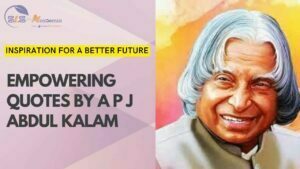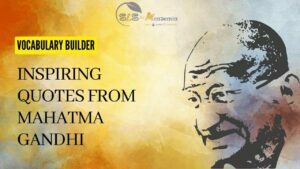Inspirational Quotes from Subash Chandra Bose
Subash Chandra Bose (1897-1945) was an Indian nationalist leader who was one of the key figures in India’s struggle for independence from British colonial rule. He was a member of the Indian National Congress and worked alongside other leaders such as Mahatma Gandhi and Jawaharlal Nehru, but his views and methods were often at odds with theirs.
Bose believed in the use of force to achieve independence, and formed the Indian National Army (INA) to fight against the British. He also sought support from Nazi Germany and Imperial Japan to fight the British. Bose is considered as one of the most prominent leaders of Indian nationalism movement during the 1940s .
Bose’s impact on Indian politics and history is significant, his ideas and methods were at odds with many of the other leaders of the independence movement, but his contributions to the cause of Indian independence cannot be denied. He is regarded as a hero and a martyr by many Indians, and his legacy continues to shape the country’s political and cultural landscape.
Inspirational Quotes from Subash Chandra Bose
Here are some of Subash Chandra Bose’s most famous quotes, organized by theme:
Quotes on freedom:
- “Freedom is not given to you, it is taken.”
- “It is our duty to pay for our liberty with our own blood.”
- “Freedom is not a gift bestowed upon us by other men, but a right that belongs to us by the laws of God and nature.”
- “Give me blood and I will give you freedom.”
- “The day we are unable to sacrifice our own personal interests for the freedom of the country, on that day freedom will be lost.”
- “Freedom is not everything, but without freedom everything is nothing.”
- “Freedom is the first essential condition of progress.”
- “Freedom is the breath of life to nations.”
- “Freedom is the first condition of growth.”
- “Freedom is the first and most precious possession of man.”
- “Freedom is the right to tell people what they do not want to hear.”
- “Freedom is the oxygen of the soul.”
- “Freedom is the birthright of every individual, regardless of race, religion, or gender.”
- “Freedom is not a reward or a decoration to be earned by good conduct, it is a right, an inalienable right, that every individual is entitled to.”
- “Freedom is the very essence of life, it is the pot of gold at the end of the rainbow, yet it is important to remember that rainbows only appear after the storm.”
Quotes on nationalism:
- “The nation comes first and the individual next.”
- “Our nation is like a tree of which the original trunk is swarajya and the branches are swadeshi and boycott.”
- “One individual may die for an idea, but that idea will, after his death, incarnate itself in a thousand lives.”
- “It is our duty to pay for our liberty with our own blood. The freedom that we shall win through our sacrifice and exertions, we shall be able to preserve with our own strength.”
- “Give me blood and I will give you freedom.”
- “It is not a matter of how long we shall live, but a matter of how much we can do for our country.”
- “I am an Indian first and last, nothing else.”
- “We must fight and fight again, until we are free from British rule.”
- “India must be free, and it will be free, before long.”
- “The nation that forgets its defenders will itself be forgotten.”
- “We must be determined to die rather than be slaves.”
- “Freedom is not given to us, we have to take it.”
- “The only way to freedom is through sacrifice and struggle.”
- “I have nothing to offer but blood, toil, tears, and sweat.”
- “We must have faith in ourselves and in our destiny.”
- “Let us unite and fight for freedom and independence, come what may.”
- “We must continue to fight until the end, until our last drop of blood, for the sake of our beloved motherland.”
- “Men, money, and materials cannot by themselves bring victory or freedom. We must have the motive-power that will inspire us to brave deeds and heroic exploits.”
- “Nationalism is inspired by the highest ideals of the human race, Satyam [the truth], Shivam [the God], Sundaram [the beautiful].”
- “The diplomacy of political bargaining is to appear more powerful than you are.”
Quotes on leadership:
- “A leader is one who knows the way, goes the way, and shows the way.”
- “A leader is one who is willing to sacrifice his own personal interests for the good of the country.”
- “A leader is not the one who always leads the way, but the one who shows the way when no one else will.”
- “The true leader is not the one who is always right, but the one who is willing to admit his mistakes and learn from them.”
- “A leader is not the one who is always in the limelight, but the one who works tirelessly behind the scenes for the betterment of his people.”
- “A leader is one who has the courage to take responsibility for his actions and their consequences.”
- “A leader is one who is willing to put the needs of his people before his own.”
- “A leader is one who is able to inspire and motivate others to achieve a common goal.”
- “A leader is one who is able to make difficult decisions and stand by them.”
- “A leader is one who is able to unite and bring together different groups and individuals towards a common cause.”
- “Remember the eternal rule -: If you want to get something, you have to give something.”
- “I did not have innate talent, but I never had the tendency to avoid hard work.”
- “Remember that the greatest crime is to compromise with injustice and wrong.”
- “The future is still in my hands.”
- “Progress in life means that doubts keep arising and the process of trying to solve them continues.”
Subash Chandra Bose’s political philosophy was centered around the idea of an independent and strong India. He believed that the only way to achieve this was through the use of force and the formation of an army to fight against the British. He was an advocate of a militant nationalism, and believed that India’s freedom could not be achieved through peaceful means. He formed the Indian National Army (INA) and sought support from Nazi Germany and Imperial Japan to fight the British.
Bose’s philosophy on the importance of a strong and independent nation, as well as his emphasis on the use of force to achieve freedom, continues to be relevant in modern times. His ideas on nationalism and leadership continue to inspire many, particularly in the context of India’s ongoing struggle to assert its place on the world stage.
It is important to note that Bose’s ideas, methods and associations are still a subject of debate and controversy. Many historian and researchers criticize his association with Axis powers and the idea of using force to gain freedom. However, his contributions to the Indian independence movement, his leadership and his ideas on nationalism are widely recognized and celebrated.
Here are some resources where you can learn more about Subash Chandra Bose and his contributions to Indian politics and history:
The official website of the Netaji Research Bureau, an organization established to promote research and study on Bose and his legacy: http://www.netajiresearchbureau.org/
The National Archives of India, which holds a collection of documents and materials related to Bose and the Indian independence movement: http://www.nationalarchives.nic.in/
The Netaji Subhas Chandra Bose Indian Cultural Centre, an institution in Kolkata, India that promotes Indian culture and works to preserve Bose’s legacy: http://www.netajisccbicc.org/
The Netaji Subhas Open University, a university in West Bengal, India that was named in honor of Bose: http://www.wbnsou.ac.in/
The Netaji Subhas Chandra Bose Museum in Kolkata, India that displays personal belongings, photographs, and other memorabilia related to Bose’s life and work: https://www.netajimuseum.gov.in/
The National Museum, New Delhi, India where you can find the exhibition “The Making of a Nation” which contains a section on Subash Chandra Bose and his role in Indian independence movement.
These resources offer a wide range of information on Subash Chandra Bose, including his biography, political philosophy, writings, speeches, and other materials related to his life and work, as well as information on organizations and institutions that continue to promote his ideas and legacy.
Whether you’re a student preparing for exams, a professional looking to advance your career, or simply someone looking to improve your communication skills and cognitive function, expanding your vocabulary can have a powerful impact on your life. So why not start today, and unlock the power of vocabulary for yourself?
We also have live online classes where we teach 2 courses which are given below. Please go through them and if interested you can take a Free Trial Class.






